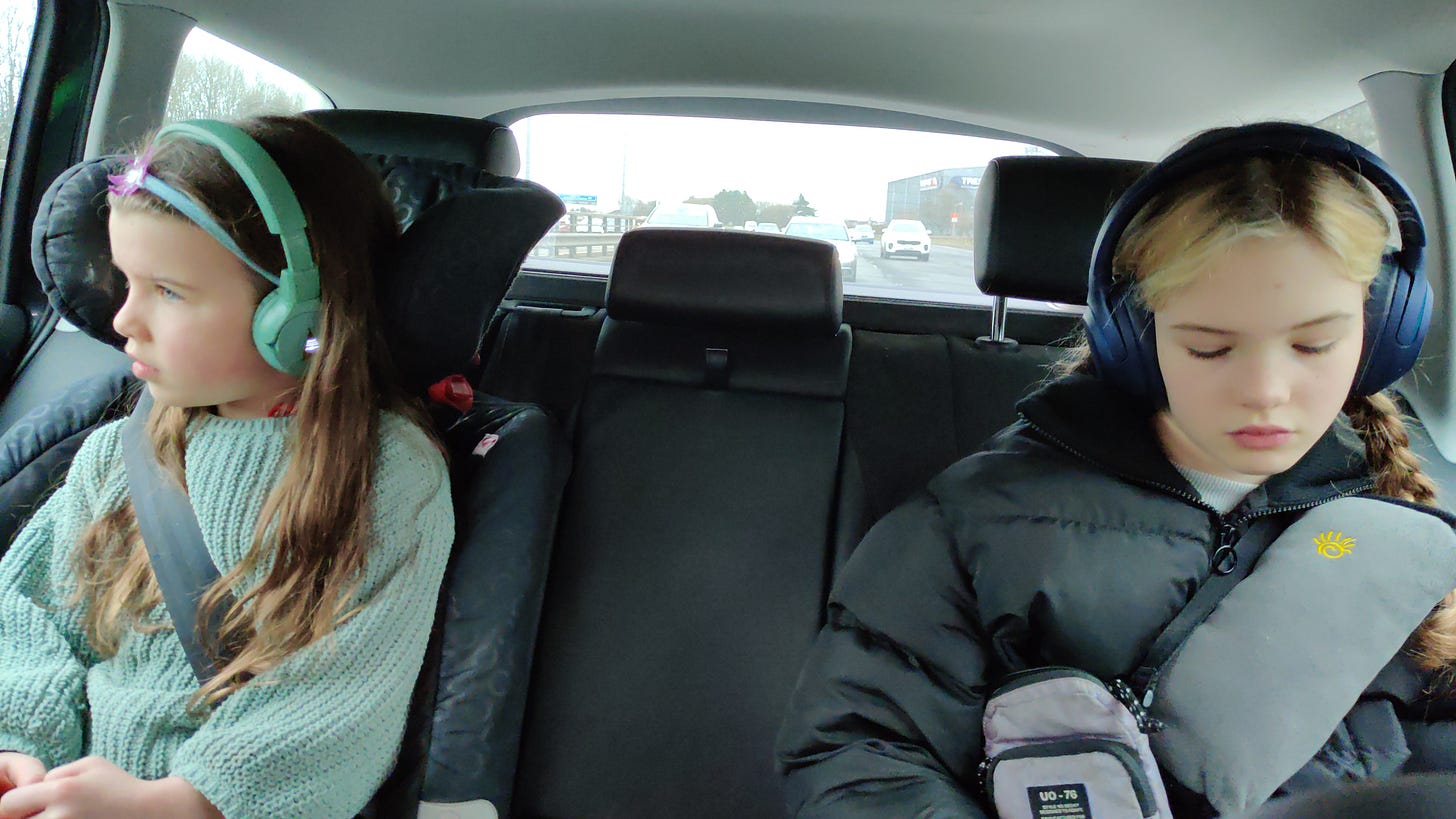The gymnastics practise hall is a 15-minute drive from our house. It’s a journey done mostly on A roads then – a few hundred yards from the building – you turn onto a B road, continue past a newish housing scheme occupying a former brownfield site then head down a single track that leads into a very small industrial estate. As well as the corrugated-iron-clad former storage unit my daughter practises in, it’s home to a used campervan salesroom, an off-site catering kitchen and the local authority’s headquarters for health and social care. I navigate past these buildings through potholes oftentimes disguised as puddles, stopping periodically to wave through drivers coming and going from their own drop-offs and pick-ups up to four times a week depending on what the other driver in my household is up to.
I wouldn’t consider myself a car person. Rather, I’m what you might call a disinterested user. Whether that makes me a “better” kind of car user is, of course, negligible. Mine is small: a 13-year-old Ford Fiesta that I became the second owner of when I had a toddler and was heavily pregnant with the child who now performs a very different type of somersault outwith the confines of my person. My purchasing criteria back then was simple: economical, low mileage, Isofix points and an NCAP safety rating of 5. All of which to say I just needed it to be safe and reliable. For it to accommodate us plus a pram and some shopping, get us back and forth to nursery and manage the odd trip to see the grandparents. It’s managed that and more for over a decade now.
Indeed, it still even manages the neglected urban terrain of the industrial estate. A terrain made worse by the vehicles that – no coincidence – manage it more smoothly than I do. Now, strap yourselves in, for I’m about to express An Opinion. I have a massive problem with the use of bloated SUVs as suburban runarounds, the drivers of which just so happen to be – in my experience – people men who routinely idle their engines. There, I’ve said it. I’ll see you in the comments.
I’ll get back to engine idling in a minute but let’s just agree that driving a massive car in an urban environment must make parking a nightmare given that, for one, most car parks haven’t caught up to accommodate the swelling size of the standard family car. In an unscientific poll of parents who drop off and pick up, my small car is very much in the minority, though, so maybe it’s really drivers like me who are feeling the squeeze? You see a space between two of those tanks knowing you can, in theory, sneak in between them and you do. You hold on tight to your door as you ease your way through the small gap, conscious it wouldn’t do for you to be identified on camera as the one that had dented theirs despite knowing in chancing it, you’re running the risk of coming back to find a fresh dent in yours. You try to be generous. Maybe their doors are just heavier? Harder to hold on to in high winds? Or maybe their driver just sees your car and thinks, what’s another dent or scrape on that? Maybe, deep down, you think it too. It wasn’t so long ago you had to apologise to the valet man for the green mould in the door seals, after all.
And yes, maybe I’m simply suffering from Small Car Syndrome and should wind my neck in. Let people make their own choices. They’ve chosen a “safe family vehicle” too and, if you’ll allow a further diversion from fumes for a moment, an “economical” one should they choose to believe swapping out their petrol or diesel car for an electric or hybrid (that they’ll likely lease and replace every three years) is good for the environment. Except I can no longer be entirely trusted to keep quiet when things rile me. It would be fair to say also I know the world is burning and, broadly, that I’m helpless to change that. Maybe having such a limited sphere of influence is what sees me trying to feel effective on the small issues of the day when, really, I’m as ineffective as they come.
Are you still with me? Let’s get back to those gas guzzling idlers.
The first time I remember it really bugging me was on a dark Friday night last autumn. I’d arrived back for pick-up reversing into a space opposite one of the SUVs only to instantly regret it since the driver had the headlights on. I wondered if I should move but decided to put the sun visor down. What is it with headlights now? Their headache-inducing blue-white light. The angle of them, pointing right into the eyes of (women) drivers in small cars that are lower to the ground? I noticed an engine purring outside. It was hard to tune it out so I opened my door to check where it was coming from. The SUV, of course. Why would anyone waste fuel like that? What privilege. What lack of care for the environment not to mention a total disregard for the lungs of the young girls inside that building (one of whom we can presume to have been his own daughter), who in a few minutes, would have to walk through the fumes belching out from an exhaust pipe not more than three feet from the path along the side of the building.



I could picture him even though I couldn’t see him (I didn’t know at this point he was definitely a he, so you can take me up for blanket gender-shaming in the comments too… not all men and that) sitting up high in the driver’s seat, his shoulders hunched, his head bowed, his mealy face illuminated by his screen. He’d be blasting the heating, scrolling the football results. Placing bets. Watching porn, maybe.
Wasn’t it illegal to sit with your engine idling? I lifted my phone from the passenger seat and discovered yes, here in the UK it is under the Road Traffic (Vehicle Emissions) (Fixed Penalty) Regulations Act 2003. I read, too, that The Royal College of Physicians estimates 40,000 deaths a year in the UK are linked to air pollution, with emissions from engine idling contributing to this. It felt like a closed case.
I’d write an email to the gymnastics club, I thought. Remind them of the law and get them to communicate with parents that idling wasn’t allowed. That’s what I’d do. I’d give him a dirty look as I got out of my car as well. Hope he understood what I meant by it. I did that, by the way, and it felt good.
“Thank you for your email. I understand your concern about the issue of vehicles running their engines while stationary but, unfortunately, we cannot do anything about whether drivers turn off their engines. We will send an email out to all parents reminding them and thank you again for supporting the Club.”
I complained to my spouse who shared my rage. Felt similarly that it was a problem the club, not I personally, should tackle while wondering whether it being on private land made it more or less their responsibility to do so. Relatedly, I could understand why a man might warn against intervening on the spot. Me, though. What could or would one of those fuckers be capable of doing to a small woman from behind his car door, I thought. These were dads, after all. Dads with daughters. Maybe some of them even went so far as to call themselves feminists.
As winter wore on, I grew bolder. Streamlined my approach. I’d get out of my car, skip towards their driver door and smile at them through the window. They’d catch my eye, surprised, and I’d gesture for them to wind the window down.
“Do you know that engine idling is illegal?” I’d start. “You can’t sit in this car park with it on. Do you know the impact your fumes have on these kids?”
The men (and yes, in my experience they have all been men) were mostly shocked to have been snapped out of their phone-dwam by a small woman at their window. A bit sheepish when I told them. They “hadn’t realised it was on”. They had been “just about to turn it off.” When I later bumped into one in gym, I softened. Under the glare of the overhead lights, I could see he was just another beleaguered, middle-aged man who’d been trying to keep warm on a frosty Glasgow night. Perhaps I should tone it down, I thought.
However. Last week, on my own street, things took a different turn. I was nipping out for a walk when I saw a woman neighbour with her baby in a sling standing on the road beside the driver door of a big car. I could tell straight away the exchange wasn’t friendly. The driver had his window down, his phone in his hand and was pointing his camera at her.
I called across the road to the woman (let’s call her Agnes the blacksmith, for her name is Agnes and she’s a blacksmith) to ask if she was alright. No, she called back across at me, she wasn’t. She’d approached this man to ask him to stop running his engine on the street and he had refused to turn it off.
“Yeah, because she touched my car,” he shouted back.
“And after that he started filming and I called the police. Now he’s got my name, my address and I feel threatened… ”
There had been an assault on his property, he said again, though less eloquently. I assumed mock ignorance and, from where I stood, gave his car the once-over. I asked whether she, a woman with a baby strapped to her, had kicked his car? Punched it? Scratched it? No, Agnes said. She had put her palm on the top of his open window to stop him putting it up when he refused to comply with the idling request.
She walked across the street to join me on the pavement, clearly shaken even though I know her – too – to be a strong woman. I asked him if he lived here (“No”). Whether he might think it sensible now to turn his engine off since the police had been called to report not just the idling but the aggression shown towards a member of the public (“No”).
I later looked up the legislation on how fines are issued for idling here in the UK. Enforcing these laws is the responsibility of local authorities, who have powers to issue Fixed Penalty Notices and order offending drivers to pay the 20 quid fine. A fine that will only be issued if the driver refuses to cut their engine when challenged by an authorised person. He clearly did not class us as authorised persons. Dared to think he might be the injured party because Agnes had held her hand over the top of his open window.
But what is it that gives a person authority to ask another person to do the decent thing? Aren’t we, the citizen, armed with the facts about the harmful impacts of idling for even 30 seconds to the most vulnerable in society enough? Must we feeble women wait for someone in uniform to turn up and rescue us? State again what we’d said, but this time with a modern-day Palm Pilot in hand?
Apparently so. Yet, where are these officials, for it’s not strictly the police's job. A report issued by the Environmental Rights Centre for Scotland last August reveals the problems even those in authority have in enforcing the law and FOI requests the previous year revealed a systemic lack of enforcement of engine idling in the four most populous urban areas in Scotland: Aberdeen City Council, Dundee City Council, City of Edinburgh Council and Glasgow City Council. These local authorities received 760 reports of engine idling from members of the public between 2019-2023 yet Glasgow City Council had not issued any FPNs during this period and the other three councils admitted they had not taken any enforcement action since 2003.
At least seven years have passed since the last registered enforcement of this law in my city. As many as 22 in other areas of the country, FFS. So even if the police did arrive, these stats suggest the driver wouldn’t have been penalised. Would they book him for a greater offence or just send him on his way?
I get that he is an extreme case. A man so threatened by a woman daring to tell him off that he would then choose to continue to idle his engine and remain at the scene in petulant protest. Maybe he had mummy issues, diddums.
Back on the street, I started to laugh at him. Told him he was both ridiculous and pathetic. I took my own phone out, snapped a picture of him and his car and wondered privately how long Agnes, the baby and I should expect to stand there, breathing in his fumes to make our point. Which of us was more ridiculous? After a few more minutes where we chatted quietly to one another and he filmed us, the two of us gave up and walked way. What else could we do? For as long as I could still see him, he sat there with the engine running. Half an hour later, he was gone. Had the police arrived? Did they visit Agnes at her home?
For me the whole thing stoked an anger that, a week later, I’m in no real hurry to shake. I think it’s because it speaks to something greater. A deep and incandescent rage I have about the way privileged men in assumed positions of power incessantly force their will upon people with little or no autonomy. The way peaceful protest at unlawful acts has, wildly, become something worthy of prosecution. We’re all angry at so much and never have we felt more powerless to effect change.
And as much as that situation was unlikely to have escalated, I could kind of see it, Handmaid’s Tale-style. Might a particular type of man, triggered in his vehicle, feel justified to do more than just say no to two women? Even a woman with a baby strapped to her front? Might the police have somehow taken his side if they'd arrived, recent images of US ICE raids and prosecutions of legal protestors no doubt causing my mind to go to dark places. We can imagine ourselves untouchable in our cars and I’m no stranger to road rage either. When a driver revs right up behind me in a lane I can’t get out of quickly enough, I tap my brakes hoping to give him a fright and make him slow the fuck down, not always considering the risk of him slamming into the back of me. I might even give him the finger from the safety of the slow lane as he speeds past me, thinking I’m safe enough to do so from inside my car.
But am I safe in my 1.2 litre engine hatchback? Or has my car – do our cars? – just given me an illusion of safety much like a neighbour standing in solidarity can; a group of like-minded protesters on a march can; an ocean separating continents can? We’re – all of us – in bubbles that obscure our true vulnerability to forces we cannot reason with. It's a vulnerability we only see when, like the heat haze from a car’s exhaust pipe on a hot day, it becomes suddenly and shockingly visible. We are vulnerable on the pavement; in the road; in broad daylight. Vulnerable to acts of aggression, moral injury and even violence when simply trying to speak up for ourselves and others who can't. And it seems we're increasingly punishable for it, too. Fighting for breath in a toxic world, poison choking us all.









Loved this, agree idling is awful on many levels, I will be channeling your courage when next subjected to it xx
Oh so we live opposite a prep school and around the corner from the grammar school and drop off/pick up time is a nightmare. One of the biggest stressors in daily life was trying to drop my own child at her school the other side of town. So we’re used to the enormous SUVs facing off in the street . Plus there’s a pretty even gender split when it comes to ignoring the zig zags outside school and the double yellow. We have a mini…a small car.
But there was one afternoon a while ago when I spotted a middle aged man parked across our drive way, I could hear the engine idling. Parking across our driveway isn’t new, it’s the right apparently of a certain type of parent so I wandered down to the bins on our driveway to make it known I was around. He put his phone down & called out (for he was in a convertible), ‘Oh I’m sorry, shall I move. Do you need to get out.’
I was feeling kind so I said, ‘no, you’re fine. Not going anywhere just now, but would you mind turning your engine off, you know the fumes. The kids, the school.’ At which point he got v angry, shouted at me and sped off in a huff 🤷🏼♀️